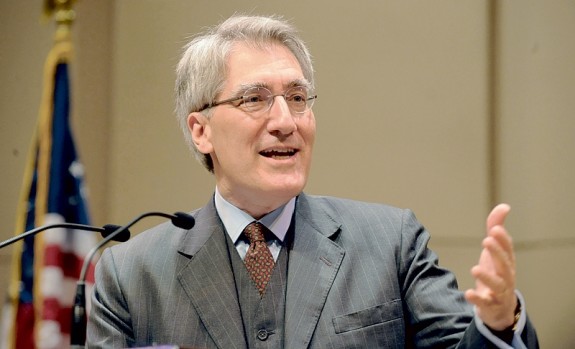 From Aesop’s animals seeking the wise owl to the people of Israel soliciting Solomon, the value of good advice has not diminished. However, one might argue that it can be harder to come by in a close-minded culture that silences dissent with the constant refrain of “do not judge me.” Nonetheless, one of the most brilliant scholars in academia – and Christian Union’s 2014 Christian Leader of the Year Award recipient – is regularly sought out by several major presidential candidates for his guidance, instruction, and wise counsel.
From Aesop’s animals seeking the wise owl to the people of Israel soliciting Solomon, the value of good advice has not diminished. However, one might argue that it can be harder to come by in a close-minded culture that silences dissent with the constant refrain of “do not judge me.” Nonetheless, one of the most brilliant scholars in academia – and Christian Union’s 2014 Christian Leader of the Year Award recipient – is regularly sought out by several major presidential candidates for his guidance, instruction, and wise counsel. Undoubtedly, Professor Robert P. George’s experience and well-cultivated mind contributes to the high value of his insights, as Bloomberg contributor Melinda Henneberger suggests in her article:
A traditional Catholic in a secular academic world, George believes that almost all of the answers supplied by faith can also be arrived at through reason—or, as he tells students, by “using the old noggin.”
“What he brings to the debate is even more method than ideas,” says his friend Mary Ann Glendon, of Harvard Law School. That method being his commitment to the proposition that, as he explains it to students, “when two people who are well disposed engage in debate, despite their differences they are bound together as a little community integrated around a common good. What is that good? Getting at the truth.”While the rest of the world might choose to move in like-minded circles, Prof. George prefers to engage intellectually with such recognizable figures as Cornel West, with whom he strongly disagrees on a number of subjects. Perhaps even more astonishing is that Prof. George is even considered a close friend of many who disagree with him:
George’s intellectual formulations are ubiquitous on the right. But just as important has been his process—the cheerful contesting of these crucial issues with those with whom he disagrees.
In fact, George says, “The best thing that’s happened in my academic life the past decade is that I regularly teach with Cornel West, who is as far to the left as I am to the right, but we love each other, and he’s got exactly the same attitude I have” about the inherent value of discussion, “and the same fears I have, that he’ll fall in love with his own opinions. It’s the best thing in the world, because you have these two cats who want to get at the truth.”
And the best single piece of advice that one of the country’s most ardent culture warriors has for students, he says, is this: “Cultivate friends you disagree with,” as well as those with whom you agree, because together you’ll locate the soft spots in your own thinking and find common ground to build on.Prof. George’s advice is similar to that which Abraham Lincoln propounded regarding people we may not understand: “I don't like that man. I must get to know him better.” The more we learn and understand about those with whom we disagree, the greater our capabilities to intellectually engage, reason, and understand the gifts and tasks that God has assigned to us. Rather than forcing opinions on one another and blindly silencing opposing thought, think of what our culture would be like if we all listened and engaged to sustain respective discourse. It would be a culture rich in life and knowledge, not one suffocating from assertions and strife.
Prof. George doesn’t know whether any of the candidates that he advises will win the upcoming 2016 election, but he does know that his faith is ultimately why he wakes up every day smiling and thinking, “the world is so messed up, but we’re going to turn this thing around.”
Note: Please keep Professor George in your prayers after a recent health scare.












